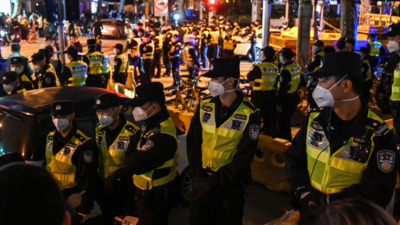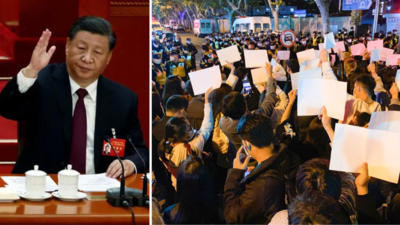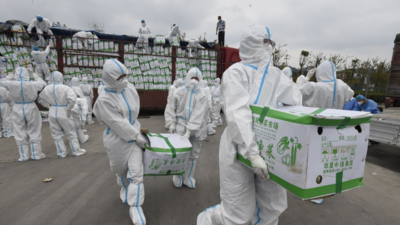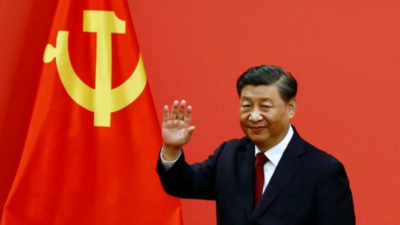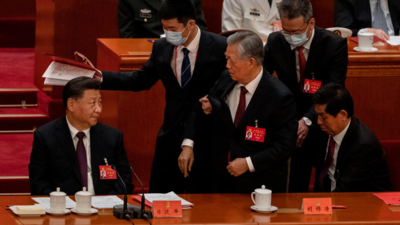Top Searches
- News
- World News
- China News
- 5 unprecedented events that threw Chinese political circles into chaos
5 unprecedented events that threw Chinese political circles into chaos
NEW DELHI: From never-before-seen mass protests against lockdowns that quickly evolved into calls for President Xi Jinping to step down, to overt attempts by Xi to consolidate power which rankled not only the public but also many of his political opponents, this year has been chaotic for China.
Here are 5 major events that plunged Chinese society and authorities into disarray:
Third term for Xi
On October 23, 2022, Chinese President Xi Jinping was elected as general secretary of the Communist Party for an unprecedented third five-year tenure. Xi created history by becoming the first leader of the CCP -- after party founder Mao Zedong -- to get re-elected for a third term. He also scrapped term limits.
The 69-year-old leader was elected by a new seven-member standing committee packed with his supporters.
Xi’s emergence as the most powerful party leader and head of the military with prospect of 'leader for life' caused concerns not just in the country but the world at large and was widely viewed with sense of unease and concern as the one-party state has now become a one-leader state.
Hu Jinato shunted out
The well-choreographed week-long 20th Congress, which 'elected' Xi for an unprecedented third term, ended on a sordid note when former President Hu Jintao was physically escorted out under the glare of the media at the ornate Great Hall of people.
The incident was seen as an irony as 79-year-old Hu had peacefully handed over power to Xi ten years ago in 2012. International media was abuzz with rumours over why Hu Jintao was removed. However, official media reports said Hu was feeling unwell.
Premier Li Keqiang's unexpected appeal
Hu Jintao wasn't the only senior leader to get an unceremonious exit, Premier Li Keqiang, who was ranked number two, got eased out in the election and is no longer part of the 200-member Central Committee.
Li Keqiang will remain premier till around March next year when a new slate of government ministers will be named.
The removal of Li, while not unexpected, signalled Xi’s continuing tight hold on power in the world’s second-largest economy. Li is a proponent of market-oriented reforms, which are in contrast to Xi’s moves to expand state control over the economy.
Earlier this year, Li was given the responsibility of overseeing China’s pandemic response, but its controversial ‘zero Covid' policy is credited to President Xi Jinping, who appears unwilling to countenance anything less than total victory over the virus.
During a video conference in June, Li urged local government officials to take action to “stabilise” the situation in China amid upset and anger over the fallout from its commitment to ‘zero Covid’.
It was an extraordinary appeal from the premier who stated that the economy was facing an even greater challenge than at the start of the pandemic.
Experts compared the appeal to a 1962 summit where CCP officials admitted to the failure of the Great Leap Forward, a disastrous campaign to modernise China’s economy that led to a brutal famine.
Li's appeal led to speculation that perhaps Xi is facing headwinds within the CCP over his handling of the Covid crisis
Zero Covid protests
A few months after Li aired his concerns and was subsequently further sidelined, mass protests broke out in China's remote Xinjiang region against President Xi Jinping's much-criticised 'zero-Covid' policy after a fire at a partially locked-down apartment building claimed 10 lives.
Several witnesses claimed that emergency response to the blaze was hampered due to the Covid curbs.
The protests spread like wildfire and within a few days over two dozen cities across China reported unrest.
The demonstrations by themselves were unprecedented in a country that is know for quickly cracking down on any signs of dissent.
What made the protests even more extraordinary was that they quickly evolved from people seeking an end to lockdowns to citizens demanding that Xi Jinping step down. Students across the country quickly joined the agitation to demand freedom of speech and freedom of expression.
China had not seen such anti-establishment protests since 1989, when protests culminated in the bloody crackdown in Tiananmen Square.
Many experts said that the Chinese citizens were holding out hope of leadership change before the 20th Congress, but after Xi assumed a third term the sense of hopelessness changed into anger. "Before the 20th Congress there was hope of policy change, but the leadership lineup of the Congress completely derailed this expectation, forcing people to take actions into their own hands".
While the anti-Xi protests were shocking in themselves, the response of the authorities took everyone by surprise. The CCP seemingly relented.
China rolls back harsh Covid rules amid protests
After nearly 8 days of continued protests against lockdowns, the CCP in early December announced a broad loosening of Covid restrictions, saying some positive cases can now quarantine at home and scaling down mandatory PCR testing requirements.
The announcement to rollback curbs came hours after the government released further data showing the crippling economic impacts of zero-Covid -- an unprecedent move by the CCP wherein it unofficially admitted that its policy may have had a negative consequence.
The mass protests and subsequent backing down of the CCP were widely hailed as signs of future political change, but experts were quick to quell the enthusiasm.
Dan Mattingly, assistant professor of political science at Yale University, said that as long as Xi had China's elite and the military on his side, he would not face any meaningful risk to his grip on power.
(With inputs from agencies)
Here are 5 major events that plunged Chinese society and authorities into disarray:
Third term for Xi
On October 23, 2022, Chinese President Xi Jinping was elected as general secretary of the Communist Party for an unprecedented third five-year tenure. Xi created history by becoming the first leader of the CCP -- after party founder Mao Zedong -- to get re-elected for a third term. He also scrapped term limits.
The 69-year-old leader was elected by a new seven-member standing committee packed with his supporters.
Xi’s emergence as the most powerful party leader and head of the military with prospect of 'leader for life' caused concerns not just in the country but the world at large and was widely viewed with sense of unease and concern as the one-party state has now become a one-leader state.
Hu Jinato shunted out
The well-choreographed week-long 20th Congress, which 'elected' Xi for an unprecedented third term, ended on a sordid note when former President Hu Jintao was physically escorted out under the glare of the media at the ornate Great Hall of people.
The incident was seen as an irony as 79-year-old Hu had peacefully handed over power to Xi ten years ago in 2012. International media was abuzz with rumours over why Hu Jintao was removed. However, official media reports said Hu was feeling unwell.
Premier Li Keqiang's unexpected appeal
Hu Jintao wasn't the only senior leader to get an unceremonious exit, Premier Li Keqiang, who was ranked number two, got eased out in the election and is no longer part of the 200-member Central Committee.
Li Keqiang will remain premier till around March next year when a new slate of government ministers will be named.
The removal of Li, while not unexpected, signalled Xi’s continuing tight hold on power in the world’s second-largest economy. Li is a proponent of market-oriented reforms, which are in contrast to Xi’s moves to expand state control over the economy.
Earlier this year, Li was given the responsibility of overseeing China’s pandemic response, but its controversial ‘zero Covid' policy is credited to President Xi Jinping, who appears unwilling to countenance anything less than total victory over the virus.
During a video conference in June, Li urged local government officials to take action to “stabilise” the situation in China amid upset and anger over the fallout from its commitment to ‘zero Covid’.
It was an extraordinary appeal from the premier who stated that the economy was facing an even greater challenge than at the start of the pandemic.
Experts compared the appeal to a 1962 summit where CCP officials admitted to the failure of the Great Leap Forward, a disastrous campaign to modernise China’s economy that led to a brutal famine.
Li's appeal led to speculation that perhaps Xi is facing headwinds within the CCP over his handling of the Covid crisis
Zero Covid protests
A few months after Li aired his concerns and was subsequently further sidelined, mass protests broke out in China's remote Xinjiang region against President Xi Jinping's much-criticised 'zero-Covid' policy after a fire at a partially locked-down apartment building claimed 10 lives.
Several witnesses claimed that emergency response to the blaze was hampered due to the Covid curbs.
The protests spread like wildfire and within a few days over two dozen cities across China reported unrest.
The demonstrations by themselves were unprecedented in a country that is know for quickly cracking down on any signs of dissent.
What made the protests even more extraordinary was that they quickly evolved from people seeking an end to lockdowns to citizens demanding that Xi Jinping step down. Students across the country quickly joined the agitation to demand freedom of speech and freedom of expression.
China had not seen such anti-establishment protests since 1989, when protests culminated in the bloody crackdown in Tiananmen Square.
Many experts said that the Chinese citizens were holding out hope of leadership change before the 20th Congress, but after Xi assumed a third term the sense of hopelessness changed into anger. "Before the 20th Congress there was hope of policy change, but the leadership lineup of the Congress completely derailed this expectation, forcing people to take actions into their own hands".
While the anti-Xi protests were shocking in themselves, the response of the authorities took everyone by surprise. The CCP seemingly relented.
China rolls back harsh Covid rules amid protests
After nearly 8 days of continued protests against lockdowns, the CCP in early December announced a broad loosening of Covid restrictions, saying some positive cases can now quarantine at home and scaling down mandatory PCR testing requirements.
The announcement to rollback curbs came hours after the government released further data showing the crippling economic impacts of zero-Covid -- an unprecedent move by the CCP wherein it unofficially admitted that its policy may have had a negative consequence.
The mass protests and subsequent backing down of the CCP were widely hailed as signs of future political change, but experts were quick to quell the enthusiasm.
Dan Mattingly, assistant professor of political science at Yale University, said that as long as Xi had China's elite and the military on his side, he would not face any meaningful risk to his grip on power.
(With inputs from agencies)
FOLLOW US ON SOCIAL MEDIA
FacebookTwitterInstagramKOO APPYOUTUBE
Start a Conversation
end of article

